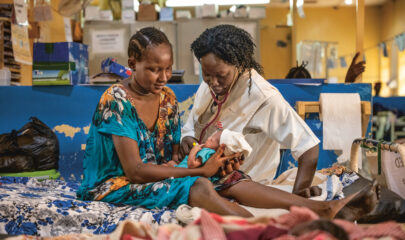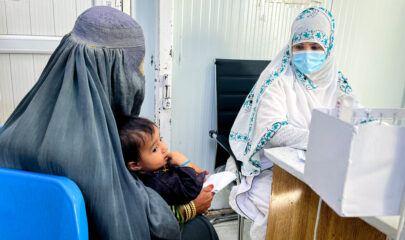Neutrality and impartiality lie at the heart of the emergency medical humanitarian work of Doctors Without Borders/Médecins Sans Frontières (MSF). That’s why MSF must have no agenda beyond ensuring the health and well-being of our patients and cannot take any positions that will compromise our ability to reach people who need assistance.
But that does not mean we remain silent. Bearing witness is a fundamental part of MSF’s core mandate: we speak out about what we see in the act of delivering care, and raise awareness not only about the crisis situations of the communities we work with but also about the causes of their suffering.
In some cases, this goes beyond simply raising awareness and extends to calling for specific change. This is when MSF engages in advocacy: when we push those who have the ability and responsibility to address the causes of the suffering we see – whether they are governments, institutions, agencies, private corporations or others – to take action.
One particular focus of MSF’s advocacy work has been equitable global access to medicines. In 1999, MSF launched the Access Campaign, an advocacy initiative through which MSF pushes for lifesaving medicines to be made more accessible to people in lower-income countries who need them.
“Ever since MSF started to provide humanitarian medical assistance to people in need, my colleagues have faced significant gaps in the availability of effective medical tools to address the health needs of people we aim to care for,” says Lara Dovifat, a campaign and advocacy advisor with MSF’s Access Campaign. “So, we continue to fight, each and every battle, drug by drug, vaccine by vaccine for fairer access.”
Those battles have included successful efforts to lower the prices of some treatments for HIV/AIDS and tuberculosis and of vaccines against diseases such as pneumonia, as well as ongoing efforts to reduce barriers to care for people suffering from a wide range of diseases. But there are still many impediments blocking access to critical medical technologies around the world.
“We are all driven by the same passionate conviction that medicines should be available to all in need, not just to people who can afford them,” Dovifat says.
MSF advocacy is not limited to access to medicines. We also call for action on direct humanitarian needs, such as demanding countries change their migration policies when they place people who are migrants, refugees and asylum seekers at risk. We have also called on authorities in the places where we work to remove barriers to the delivery of humanitarian care, and for the United Nations and other agencies to better protect civilians and healthcare workers in conflict zones.
There are limits to how far this can go: MSF is an emergency medical care provider, not an advocacy organization. But the ultimate goals of our humanitarian medical work are to prevent avoidable deaths and reduce human suffering – so any time we have an opportunity to influence the decision makers who can help deliver those outcomes, we take it. That’s why MSF strives to maintain a broad network of advocacy channels, to allow us to communicate directly with governments, non-state groups and anyone else with influence over access to healthcare in the places where we work.

facing HIV in Myanmar since 2001. Myanmar, 2021.
“We continue to fight, each and every battle, drug by drug, vaccine by vaccine for fairer access.”
“Global public health advocacy can sometimes feel slow and frustrating,” says Dr. Jason Nickerson, MSF’s humanitarian representative to Canada. “The reasons behind the unmet humanitarian and medical needs MSF teams witness around the world each day can be relatively clear – poverty, conflict, environmental degradation – but the potential solutions to them are complex, and the parties most responsible are often able to avoid direct accountability. But that is also why it is essential for MSF to use our voice and to stand up with and at times on behalf of our patients.”
MSF’s approach to medical humanitarian action refuses to accept that political considerations should play any role in determining who can access essential health services. Our teams are focused on addressing immediate needs, rather than on dictating policy.

launched in response to the food emergency in the southern region. Madagascar, 2021.
But we have seen first-hand how political decisions can make the difference between life and death, especially for marginalized communities. And so even as we retain our fundamental neutrality and impartiality, we also use our voice to push for better outcomes for our patients and their communities, in every way possible.
MSF ADVOCACY EFFORTS AROUND THE WORLD
BENTIU, SOUTH SUDAN
In 2014, MSF began providing medical care to residents of the UN-run Bentiu Protection of Civilians camp, where tens of thousands of people fleeing the violence of South Sudan’s civil conflict had taken shelter. Since then, we have repeated- ly advocated to camp authorities to address appalling living conditions, including water and sanitation conditions that have contributed to outbreaks of Hepatitis E and other illnesses. The camp has been recently redesignated as a camp for people who are internally displaced and is now run by the government of South Sudan.
ACCESS TO TUBERCULOSIS MEDICINES
In 2020, MSF called on Johnson & Johnson to lower the price of bedaquiline, a critically needed and effective tubercu- losis treatment research shows can be produced and sold at a profit for as little as 25 cents a day, yet which Johnson & Johnson has insisted on selling at several times that price.
COVID-19
Since the beginning of the pandemic, MSF has called on governments around the world, who provided billions of dollars of public money for COVID-19 vaccine development, to take steps to make those vaccines more globally accessible. MSF has specifically called for action at the World Trade Organization to support the sharing of intellectual property related to COVID-19 medical innovations.


